
A League of Nobleman
5 persone hanno trovato utile questa recensione
Questa recensione può contenere spoiler
A Delightful Dose of Gentlemen
On paper A Noble League of Gentlemen is a show that’s… in the vernacular… very much my jam. It feels like we’ve been waiting for this one for the longest time. It’s first and foremost a whodunit that is set in a politically-charged imperial court where a ruthless Empress Dowager rules behind the scenes with an iron fist. The show inevitably ventures into the realm of political negotiation which raises the stakes for the show’s primary sleuths. It’s clear too even from the start that survival (political or physical) takes precedence over the truth. The detective side of things reminds me of a television favourite, the UK series Jonathan Creek — certainly in its use of illusion and misdirection all throughout the series. The show, I believe, is at its best when the team are solving cases and getting deep into the weeds of how the perpetrators got away with it. This is where the writing shines in its eye for meticulous detail.I started this for the very charismatic Jing Boran. I last saw him in The Psychologist (and its concluding follow-up He Dun’s Happiness) where he was one of the show’s bright spots. In my opinion he’s even better here when his versatility is given room to breathe. Jing Boran is Deputy Minister for the Ministry of Rites, Lan Jue (style name: Peizi). Much of the show sees him solving mysteries in the capital of Great Yong with Song Weilong’s Zhang Ping that seem to have links to a horrific series of events 20 years earlier in a place known as Moluo Village. On that occasion Lan Jue’s father was accused of treason and was executed accordingly. The son, however, is now on a secret mission to clear his father’s name. The relationship between Lan Jue and Zhang Ping is born out of suspicion and conflict but when they find common cause, it’s Mycroft and Sherlock against some rather formidable foes. And yes, there is a Moriarty lurking in the background pulling strings. It took me a lot longer to warm up to Zhang Ping whose rigid adherence to rules makes him impetuous and lands him into all kinds of proverbial hot soups — an appropriate metaphor considering that he runs a noodle street stall to pay for his living expenses. He comes to the Big Smoke as a scholar studying for the imperial exam while moonlighting as a detective who sticks his nose into everything suspicious for love of truth. At times he’s a bitter pill to swallow. But the sugar that helps the medicine go down is the repeated acknowledgement by the script that this is a flaw and backs that up with actual consequences for his busybody restlessness. He’s trying to be a black and white guy in a world of grey power plays. It’s akin to playing his own game in someone else’s backyard with no clue as to what their rules are.
As the title suggests, this is a male dominated cast that is unabashed in it celebration of masculine archetypes — father figures, mentors, protectors, warriors, brothers — just to name but a few. The beauty of this show is that it isn’t just about the leads Lan Jue and Zhang Ping. It’s a team effort that is underpinned by a brotherhood that transcends status and wealth. Deep connections can be made not just among intellectual equals but even between masters and servants.
The inclusion of the mysterious Shulin so late in the story feels like a double-edged sword. The actor, Wang Duo, is very good at drawing out the character’s complexity and yet even with all the nuance in the performance, his part in the narrative and its resolution ends up far less satisfying than it might have been because the show is determined to say something about the corrupting tendency of absolute power. The resolution is logical for the show that transpired but one is left wondering if making justice a casualty in all this is worthwhile for the individuals who worked so hard to gnaw at the truth.
It is hard to say much more without giving away spoilers. While there are seemingly disparate cases, it becomes increasingly obvious that they are intertwined. As a rule I have nothing against Bad Guy plots making bombastic statements about the world. However, it has to be done well. When it isn’t done well, it’s like moustache twirling villains doing a monologue and bragging giving their adversaries time to get their act together. It’s about theatre. Restoration takes a back seat. The purpose too with the Bad Guy plot is to create a moral dilemma — an unnecessary one — that’s probably meant in part to be a coming-of-age moment for Zhang Ping.
This is one that I found thoroughly immersive and beautiful to look at. I’ve heard that this was heavily censored but this is one occasion I had no problems with the editing because I never felt that I was missing out on anything essential. In fact, the pacing of this show not bogged down by fillers or detours was very much my cup of tea. Frankly I wish more C dramas would be equally disciplined in its storytelling.
Questa recensione ti è stata utile?
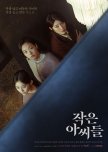
A Veritable Dollhouse of Absurdity
The experience of watching this so-called homage to Louisa M. Alcott’s beloved tale is like playing a game of blind man’s bluff. The audience is positioned as the player in the middle, blind-folded, groping around trying to make sense of the surroundings only to be led by a cacophony of sounds which may either prove to be helpful leads or egregious misdirections that lead to nowhere. Rather than being any kind of thoughtful of adaptation of Alcott’s timeless series, the roots of this Korean drama lie in the overlong weekend family dramas infamous for their ridiculous plot lines punctuated by unbelievable twists and turns, protracted conflicts that are designed to leave audiences begging for more week after week. It’s a combination of pure farce, high melodrama and an unabashed (even gleeful) exploitation of tropes. Polished as it may be, it is still a makjang. From the first, this story positions itself as a morality tale cautioning against the consequences of greed and ambition from its use of the red shoes motif only to end up with a bewildering incoherent resolution that undermines the story’s early messaging.The show throws the spotlight on two adult sisters from a working class background. They are Oh In-joo (Kim Go-eun), Oh In-kyung (Nam Ji-hyun) as well as their teenage sister Oh In-hye (Park Ji-hoo), a talented artist who has caught the eye of a certain Ms Won Sang-a (Uhm Ji-won), an ambitious wealthy woman who is married to an aspiring politician Park Jae-sang (Uhm Ki-hoon). The unsuspecting Oh sisters who lament their meagre lot in life are drawn into a web of deception on a scale that they are laughably ill-equipped to handle. It suits the writer’s agenda to place these babes in the woods in such an unlikely situation as they flounder around in search of answers.
The real trouble begins when In-joo a bookkeeper finds herself tempted by the offer of 2 billion won of cash left to her at the pleasure of her colleague Jin Hwa-young in a gym locker. It’s more money than In-joo has ever seen in her young life but it comes with a high price tag and puts her in an ethical predicament. Apparently Hwa-young has been playing around with Other People’s money and suffered the consequences. In-joo is in over her head and it’s Choi Do-il (Wi Ha-joon), her company’s accounting manager and money laundering expert, to rescue. Apparently the company has a habit of accumulating ill-gotten money and key people in the organization are involved in helping the Park-Won family creating slush funds to further their political ambitions.
While the performances range from great (Kim Go-eun, Wi Ha-joon and Uhm Ji-won) to good, in the overall scheme of things the characters don’t matter much because they are quite literally putty in someone’s hands. They exist to tell a story like miniatures in a diorama or figures in a dollhouse. The dollhouse metaphor is deliberate on the part of the writer who wants to weave a fairytale about the ordinary confronting the extraordinary similar to any Brothers Grimm tale. While there are no talking animals or supernatural beings in the mix, the show nevertheless relies heavily on miracles. The Oh sisters are fated to embark on a journey through a dark forest of evil and they cannot be certain who is friend or foe. They are almost always somebody’s plaything and dependant on the goodwill of others for their survival. There is an appearance of agency but the Oh sisters can only react to the situations they inevitably find themselves in due to the machinations of others.
There’s little that is relatable about the Oh sisters. They act impetuously in service of the plot. There’s nothing realistic about them or the situation they find themselves. At times it’s hard to believe that they might have been a close-knit family once when they spend far more time with others than each other. Using In-joo and In-kyung in particular as the primary windows into this world is a double-edged sword. More often than not their supposed bravery comes across as recklessness and lack of circumspection.
Won Sang-a the show’s primary antagonist fancies herself an unfulfilled thespian and plays out her fantasies with lesser mortals. She’s General Won’s daughter and her wealth enables her to indulge in her narcissism and megalomania. She likes secrets and she takes perverse pleasure in gamefying scenarios involving desperate malleable individuals where she commands their inevitable outcome. On the other hand her relationship with husband Park Jae-sang involves a series of sex games in which she manipulates him while he enables and cleans up after her. At first it seems like he’s a controlling abusive husband but it doesn’t take long before it’s clear who’s really calling the shots in that dynamic. She represents the figure of the witch that’s the staple of many beloved fairytale as she’s an inveterate schemer and master manipulator that casts her spell on those she deems dispensable.
In that vein Little Women is a witch’s brew as it mixes high stakes criminal activities with family dysfunction, romances and a conspiracy that goes back decades. The set-up brimming with potential, hitting the climax in Episode 10 only to end with a whimper in Episode 12. For a show that traded relentlessly on plot twists and shock factor, the finale felt strangely flat and mind numbingly… tedious. In effect the writer overplayed her hand ad absurdism; to the point where the final showdown between the protagonist and antagonist feels comedic rather than revelatory thus diminishing the impact of the moment.
Despite the title, the highlight of the viewing experience is Choi Do-il, who grounds the show for me. Almost everything else about the show is a farce in every sense but Do-il feels like a bright spot in a bleakly surreal landscape and more’s the pity that this show isn’t about him. Although he makes claims to being entirely mercenary, he is the sanest creature in this cat and mouse insanity — a reassuring constant in a sea of madness for the artless In-joo. He is her lifeline from start to finish. Without him she would be six foot under or ashes in an urn. The romantic tension between them evidenced from the start regrettably doesn’t have closure which begs the question — is the show leaving the door open for a second series?
A show like this can be an engaging watch depending on mood and the extent one is willing to suspend all manner of disbelief because at the end of the day such dramas don’t exactly prioritise logic or consistency.
Questa recensione ti è stata utile?
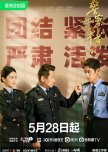
Extraordinary Delight
Among the numerous police procedurals that have fallen off the C drama assembly line of late, Ordinary Greatness has earned itself a unique position among them all in terms of its slice-of-life approach and grounded storytelling. While there are cases (large and small) to be tackled, this is a drama primarily focused on the hectic lives of the men and women in blue viewed through the lenses of four recent recruits and their experienced mentors as they navigate the murky waters of modern day policing in the environment of a regional station. Overseeing the doings of the rank and file as well as nagging them into shape is the sagacious Wang Shouyi, the station’s head honcho and everybody’s go to guy for permission and advice. He is the cantankerous, good-hearted uncle everyone never knew they needed in a pinch that is, until he’s noticeably absent. At any given time Chief Wang (Wang Jingchun) leads with velvet gloves or iron fists while others follow… willingly.Zhang Ruoyun, Ba Lu, Xu Kaichen and Cao Lu play the four recruits of varying backgrounds who come to the station with personal baggage that may or may not have implications for their work performance. Most of the very best parts of the show feature their respective dynamics with their mentors Chen Xincheng, Cheng Hao, Cao Jianjun, Zhang Zhijie. The cunning station chief in his profound wisdom has deliberately paired off opposites (much to the initial dismay of some) so that the process of learning is mutually beneficial. This is the chief's hidden agenda which I call Operation Healing. Wang Shouyi wants to fix his people whether or not they seek his ministrations. In truth second chances, healing and moving on from the past are all part and parcel of the strong moralising tone of the narrative. The mentors here act as surrogate fathers in all cases but especially for the two youngsters raised in single mother households. And yet three of these flawed men who have their own backstories that are in search of a resolution. This is where the heart of the show lies, making it much more than an extended recruitment advert for the police services on the mainland.
Led by the gregarious Li Dawei (Zhang Ruoyun) brimming with initiative, the four newcomers form their own close-knit group where they share their struggles and fears. Each is given their own growth arc. Not only do they share a flat together but they become firm friends. There’s surprisingly no rivalry, jealousy or resentments — just good o’l fashion camaraderie in good times and in bad. Thankfully too there’s no romance or love triangles entangling them in more unnecessary complications because that would end up defacing a masterful work of art. Being romance free among the four friends means that romance tropes were nowhere in sight, preventing them from destabilising the story’s primary achievements.
The drama begins with a phone conversation between the chief and his superior at the bureau. Their station is overworked and understaffed in a busy area so after a bit of haggling with the director at the bureau, he is given four fresh faces — a landmark in the history of Bai Li He Station. So he says at least. Pleased as punch with his recent acquisition and killing time before the welcome ceremony commences, he embarks on a tour of the station which is seen via a tracking shot from his office to the balcony and down the stairs, barking orders to anyone within earshot. This acts as the audience's introduction to the life and times of Bai Li He. Within the mix of the chatter that follows, there’s friendly collegial banter, bragging, complaints of fatigue and foreshadowing in this quick initial sequence. It’s a quick taster of the goodies to come.
In this large toolbox of camera techniques, the tracking shot is a key lever of storytelling. The station is the central set piece which is a record of continuous activity. It is the household that never sleeps as it plays hosts to the residents with never-ending problems. Day and night, there’s someone at Bailihe at the reception taking calls. All location shoots lead to it. The effect of being able to follow the characters all around the station provides a near documentary-like exposure to the ins and outs of a busy police station dealing with anything from household registrations to murder. It is the coalface of the organization, the first line of inquiry. Hence, the good, bad and the very ugly of humanity as well as the scourge of materialism are on full display here.
As much as this is about policing, the show makes it clear that the police station isn’t just a place where the problems of the people find solutions but where familial bonds are formed. At least with Chief Wang at the helm, the station feels like a warm, caring place — a home away from home. For instance, when a member of the team takes time off work to care for a dying relative. The chief orders a roster to be made up to help support the officer until the end. In truth no one, not even cops, can escape the harsh realities of life but the effects can be mitigated when one is supported by genuine community.
The end of a story marks the end of a journey and the beginning of another. For some the learning curve has been brutally steep and there’s palpable growth which only experience in the school of life can give. It’s the hero’s journey multiplied manifold and writ large. Policing is a calling and only those who are called can move to its drumbeat despite the less than ideal working conditions. It's not a career but a lifelong service to the community that leads ordinary people do to extraordinary acts of heroism without any expectation of personal gain.
This is a drama I could have easily watched another 10 episodes of — something I don’t say often, particularly about C dramas. However, this is a rare beast of being quality production from the moment it begins to where it ends. It's a masterclass in visual storytelling. The moment I stepped into their world, I laughed, shook my fists, sighed and wept for the men and women of Bai Li He Station.
Questa recensione ti è stata utile?

I misteri del café Minamdang
8 persone hanno trovato utile questa recensione
Wild and Wacky
Cafe Minamdang is a silly but good-natured romp that positions itself within the tradition of slapstick buddy cop procedurals while conducting an uneasy dalliance with the serious side of criminal profiling. It’s no marriage made in heaven as the ensemble hunt down an elusive serial killer who seems to be connected with the upper echelons of South Korean society. Indeed how does one successfully reconcile the comedic with the more serious elements? Not easily and the mixed results speak for themselves. Seo In-guk who plays former forensic profiler Nam Han-jun turned consulting shaman gets to display his comedic talents with shameless glee as he robs from the rich while trying to solve crimes with his partners-in-crime, Kong Su-cheol (Kwak Shi-yang) and sister Nam Hye-ju using their individual skill sets. Han-ju is reduced to grifting as a shaman in his popular cafe using his mentalist abilities because he was wrongly convicted for fabricating evidence in the aftermath of the murder of his bestie the late Prosecutor Han Jae-jeong. After serving time, Han-jun is determined to track down the killer while amassing resources earned through the cafe. It doesn’t take long before he starts to cross swords with Jae-jeong’s younger sister, Jae-hui (Oh Yeon-seo) who despite her rank is really a third-rate detective who is investigates using her unreliable gut and is prone to emotional outbursts. In fact her entire team comprises of a rag tag of ne’er do wells that often have their rear ends handed to them by the unofficial sleuths from Cafe Minamdang (the front for Han-jun and Co.’s real agenda). Jae-hui misunderstands the flamboyant Han-jun but he prefers it that way especially when he doesn’t know who she is.Like many South Korean dramas of its type, the show mercilessly mocks the wealthy and the powerful not just for their avarice and flagrant disregard for the rules which are only for the plebs. It even manages to poke fun of wealthy parents with more dollars than sense in an unexpected foray into nature vs nurture territory on top of everything else the show crams in. Furthermore materialism is a scourge of society that afflicts the religious as represented in a character like Auntie Im and the irreligious for whom religion is a tool to gain power. Han-jun maybe an egotistical religious huckster to the more discerning but his razor sharp observation skills and ability to think on his feet sees him often in service with the angels until he is strapped for cash.
The 18 episode format is an overkill. This is a story that could have easily been told in 12 episodes but for the unnecessary insertion of romance which frankly adds nothing to the storytelling or character development. That said Seo In-guk is adorable even in his more pubescent outbursts. It is his onscreen charm that carries the romance as much as it is possible. The drama however is not enhanced by it or by Jae-hui’s presence. Her antics are particularly hard to watch in the first half as she’s bumbling around at playing detective, getting in his way and basically being a hinderance to actual investigative work done by the unofficial sleuths who have inserted themselves into an investigation illegally. It is something of a running gag that the police are so incompetent at the start, a situation made worse by Jae-hui’s lack of professionalism as she stubbornly sets her sights on a single line of inquiry in the early episodes. Her tendency to be overly emotional (there are good reasons why cops aren’t allowed to investigate cases involving family members) and freakishly violent is undoubtedly written to be a point of humour but comes across much more as annoyance for at least half the show. She’s in it to put the breaks on the real investigation and her violent spurts directed towards Han-jun don’t reflect particularly well on her.
18 episodes is also rather too long for a show primarily concerned with uncovering the identity of a mysterious serial killer especially when it is fairly obvious to the audience who that individual is quite early on. While there are no lack of red-herrings and false trails to lead the show’s investigators off the beaten track for the show’s most scary bad guy, there is no lack of real villany on offer whether they be chaebol heirs, corrupt politicians and supposedly real shamans who abuse their power.
It also takes far too long time for the two sides to start working together even though it’s always fun to have a giggle at official detectives’ expense. But when they finally do collaborate, things move far more smoothly for all concerned, expediting proper detective work.
Last but not least, the humour, which is perhaps the most important consideration of all, is an acquired taste. It’s over-the-top, slapstick and unabashedly wacky but it still manages to get laughs out of an old stodgy type like myself. Seo In-guk and Kwak Shi-yang are particularly ridiculously hilarious especially when one considers what they they are willing to do to create these larger-than-life caricatures. Even in my more doubtful moments I laboured under the belief that since I survived Vincenzo I could survive this which I did… and even enjoyed much of it.
It’s not a great show by any stretch of the imagination (although it could have been if it had been leaner and tighter) and the flaws are plain to see from the start. As far as the whodunit side of things are concerned, it does nothing spectacular or novel. But when Nam Han-jun flicks his folding fan and turns on his crazy shaman shtick, it’s almost a guarantee that we’re in for a wild and raucous ride.
Questa recensione ti è stata utile?

Murmurs of the Heart
By almost every objective metric, The Heart should have been one of the year’s best dramas. In truth it is the best medical drama I’ve seen so far coming out of the mainland. (Although I haven’t seen that many good ones truth be told) The script is meticulous, well-researched and the character arcs are brilliantly woven into the story. But tackling all 38 episodes is likely to be a marathon for many especially in the home stretch. It could have been China’s answer to Hospital Playlist but sadly lacks the latter’s impulse for economy as it inevitably gets bogged down by romances that it arguably doesn’t need. It’s a shame really because the series has a plenty of heart and the relationship among the three leads is one of the show’s bright spots. Moreover the patient stories and their unveiling within the show’s larger tapestry are among some of the best I’ve ever seen.Mark Chao, Jin Shijia, Rachel Mao Xiaotong are the aforementioned leads in this slice-of-life drama a cardiology specialist centre as its backdrop. Mark Chao is Zhou Xiaofeng, a mild-mannered cardiology internist, Jin Shijia (from Under the Skin) is a cardiac surgeon Lin Yi and Rachel Mao plays Fang Xiaoran, an ICU doctor with surgical training. Xiaofeng and Lin Yi are polar opposites in temperament. Lin Yi though a talented surgeon is something of a loose canon and tends to run his mouth. Xiaofeng is a capable administrator but defers a little too much to his ethically challenged mentor. Xiaoran, on the other hand has the best bedside manner of the trio. Unknown to most of their colleagues, Xiaofeng and Xiaoran are half siblings. Their mother is a famous cardiologist Fang Zhuqing who divorced Xiaofeng’s dad when he was a boy. Mother and son are estranged from one another and part of Xiaofeng’s journey is to gradually reconcile with her.
As with all good camaraderie that is forged through fire, opposites clash at first but it doesn’t take long for them to appreciate the other’s skill set and even become a dynamic duo for more complex, multi-stage procedures. Lin Yi’s life is further complicated by the fact that he’s also the primary caregiver of an older brother who is living out the final stages of a genetic heart disease that could also afflict him at any time. It’s the sword that hangs over his head. There’s no cure for the condition but it is that which animates his embrace of medicine and his attitude towards patient needs.
A major chunk of the show is about the inner workings of the cardiology unit from the administrative side of things to inpatient consultations. It peels away the perceived glamour of the profession by featuring plausible predicaments related to short-term and long-term patients who wander around the hallowed corridors of the hospital. Right from the word “go”, it’s clear that the demand for medical services outstrip the supply. Medical staff with all their own personal baggage are overworked to the bone. Yet they are still expected to perform 110% once they put on the uniform. In that light, the drama highlights not only the limitations of medical science as it currently stands but also the enormous responsibility of clinical practice at every level. From inpatient visits to pre-surgery consults and post-operative recovery in the ICU.
In addition cardiac medicine also serves as a recurring metaphor and vehicle for a larger conversation about the importance of community not just among the medical professionals but the patients who temporarily find their place in that place. Medicine is more than a science. Everyone has a story. Strangers who occupy the same space for a period of time form a bond that have important consequences for the future. Some are pulled from the cusp of death while others never leave. But all leave indelible traces behind providing crucial life lessons.
There’s a part of me that is keen to recommend this. The production values are high. The cinematography is excellent and the casting is generally right on the money. However 38 episodes might be a slog for some and more importantly, there aren’t any good subs that I’m aware of. Still if you’re keen on a good heartwarming thoughtful drama, this could be the thing to hit the spot.
Questa recensione ti è stata utile?
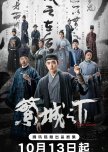
A Dish Best Served Cold
Is revenge justice? That's the recurring question that permeates the gloomy atmosphere of this 12-episode serial whodunit set in the waning days of the Ming Dynasty. This plodding but fascinating tale of wrongdoing and comeuppance is told in flashbacks and largely from the point of view of its present-day protagonist, Qu Sangeng (Bai Yufan), a bailiff of his county’s constabulary. On the surface it has all the elements of a juicy Agatha Christie murder mystery but in and among the dastardly deeds committed in the dark is a document of a civilization on the cusp of collapse. The country’s foundations are rotting and the cracks are showing even in the smaller scale corruption at the local level. It reminds me of the oft quoted saying that "the only thing necessary for evil to triumph is for good men to do nothing." It's been misattributed to Edmund Burke (I've been told) but it still rings true and reverberates all throughout this tale of unsavoury secrets and people looking the other way.The story begins when Qu Sangeng (Bai Yufan) finds the body of his beloved mentor, Captain Leng, strung up in an open field like a scarecrow. From then on the lad embarks on an extensive inquiry into his mentor’s death which doubles up as an exploration of the deceased’s life — his relationships and how he carried out his role as chief of the Hunters Squad. No one likes to speak ill of the dead apparently but the truth is when a man dies in such gruesome fashion, the general rule is that he was privy to some horrifying secrets before his untimely demise. It begs the question: Did his mentor do something he was ashamed of? This thought haunts Sangeng all throughout the investigation while he struggles to maintain some measure of objectivity. On top of that Captain Leng, a husband and father of two, is revealed to have regular night time assignations at a local brothel with a seasoned prostitute (Zeng Li). A part of Sangeng knows that his mentor was prone to cross lines for the job but turning over rocks for a big case is bound to end up in cupboards crammed with skeletons. As Sangeng delves into the rabbit hole of Capt Leng's past, he is led to digging further into a horrific fire that happened 20 years ago where an entire household was burnt to an unrecognizable crisp.
Qu Sangeng's probe into that incident inadvertently results in unpleasant revelations about respectable members of the community. One by one they get picked off almost as if they have knowledge of something sinister in the past that they've taken with them to their graves. Sangeng's journey of discovery is juxtaposed with flashbacks of a lowly but highly intelligent attendant Lu Zhi (Yu Yao) named after his master Lu Yuanbao. Somehow the plight and experiences of this orphan from 20 years earlier is connected to these grisly murders. Yu Yao, who looks like a much younger version of Korean actor Yoo Ji-tae, is charismatic in the role. He carries himself with confidence and exudes a wisdom beyond his years. Bai Yufan last seen in Stand By Me (2023) puts in a solid performance and he's wonderfully supported by Ning Li who plays Judge Song, Liu Yitong as Gao Shicong and Zhang Haowei as Feng Keshui. Since Reborn (2020) I'm always glad to see Zhang Haowei in anything watchable although his role here is relatively small.
No one can accuse the show of mishandled plotting because the script is tight as tight can be. The details are aplenty. Although I understand the intent of the showrunners to plumb the depths of character motivations and spell everything out in large letters, the pacing could be improved by some trimming. Even in a 12 episode drama. As a fan of the genre, I'm in admiration of the intricacies of the narrative with the decent-sized ensemble of characters but no crime show from the mainland ever escapes the mighty hand of social commentary. There's plenty of finger wagging certainly but the show doesn't overtly take sides although it's clear that revenge in the name of justice leads to a high body count that includes bystanders caught in the crossfire.
Questa recensione ti è stata utile?

A Cliche Story Done Better Elsewhere
In an era where C dramas are falling off the production line faster than most of us can keep up , thirty-something hours of your time could be better spent on a show of better quality. The curious part of me would love to know what it was that they were imbibing in the writers' room when the script was cobbled together. (From an existing source material no less) Or smoking for that matter. There are plenty of problems with this production starting with the amateurish screenplay which was meant to provide the backbone to this. The Legend of Anle claims to be a revenge/justice story centred around a highly intelligent accomplished young woman who does a Count of Monte Cristo turn. But the showrunners don't seem to understand rudimentary storytelling much less the visual medium of television for that claim to be convincing. For instance we are persistently hit over the head with the message that our protagonist here is brilliant. Indeed she's happy to brag that she's got the whole thing sewn up because she's the best thing since pork dumplings. Her schemes are nothing to write home about and several are reliant on the stalwart Han Ye (Gong Jun), the crown prince to be on board. When she's busy doing the heavy lifting, the other leads are hiding in the background watching her work and providing running commentary. I like Gong Jun enough to persevere. His character was brimming with potential. But I too think he wasted his time on this fiasco of a production.It's not hard to see where the problems lie even in those early episodes. While historical dramas pandering to a younger demographic are nothing new, there's a dreariness that hovers over this production that makes watching much of it a slog. Even Dilraba's flirty girl boss pirate act as she bursts into the scene comes with a dose of cringe. Things like that while mildly amusing at times breaks immersion and doesn't bode well for what comes down the pike. The show does nothing more that better revenge/justice stories have achieved on a larger scale with far more thought put into them. It has the bad habit of recounting events through dialogue where key events occur offscreen. What's worse is that some characters are just there to instruct the audience on how a scene should be understood or how another character feels. The job of these side characters too is to hit us over the head ad nauseam with how much the leads are in love with each other and it's a pity that they can't be together. This certainly shows a lack of confidence by the director in the performances and the script to convey the most fundamental story threads with spoon feeding.
All in all it's a strange start, stop, drag experience. One that I don't recommend. You can certainly do better elsewhere.
Questa recensione ti è stata utile?

A Tale of Two Men
Ji Chang-wook returns to crime action in this historical thriller about the South Korean underworld in the late 1990s. He dons the blue uniform as Park Jun-mo, a low-ranking detective co-opted by his superiors to infiltrate an enterprising Gangnam gang operating nightclubs openly and dealing in methamphetamines in secret. He is married to Yu Eui-jeong (Im Se-mi) a fellow police officer who at the start of the show is already an inspector transferring to the security division. As a result Jun-mo is routinely made to feel his place by his snobbish in-laws who are all elite officers themselves. When first approached by the prosecutor-in-charge and his senior, Jun-mo hesitates. But with the prospect of promotion (and respectability) waved under his nose, he eventually succumbs and agrees.Jun-mo’s primary foil is Jung Gi-cheul (Wi Ha-joon) the founder and head of the Gangnam Union. Formerly a popular nightclub disc jockey who grew up in the area, the savvy and ambitious Gi-cheul takes up the offer by a local mob boss to head up his own nightclub. His inner circle consists of a group of friends from high school and their loyalty to him seems unwavering. Not content to be earning chump change, he wants to expand his operations to drug distribution but is flatly rejected by his backer, a notorious figure known as Sgt Jang. Like Jun-mo, Gi-cheul craves respect which he thinks money will bring. He is tired of being trampled underfoot by rich junkies and his direct supervisor so he devises a coup then buys over the biggest mob boss in the country based in Busan.
Despite all the violent blood-letting that’s on display, this is essentially a character study of two men. They’ve been dealt a similar hand at the start but made different choices along the way. Due to unforeseen circumstances, interventions and choices they end up in different places. The proposition that Gi-cheul could have ended up with Eui-jeong is not too far-fetched or that Jun-mo could have ended up as a member of a gang is highly probable. The moral argument (and the show's contribution to the nature vs. nurture debate) seems to be that human beings are the sum of their choices regardless of external intervention.
It's been a while since I've read F. Scott Fitzgerald's literary classic but Jung Gi-cheul bears more than a passing resemblance to Jay Gatsby. Instead of bootleg, Gi-cheul is the purveyor of an item known as Gangnam Crystal. He is the South Korean link in a deadly drug distribution triangle that includes Japan and mainland China. His goal from the first to the last is the girl -- Yu Eui-jeong, a woman he's been in love with since high school. Like his American counterpart, he is the symbol of the South Korean dream. Accumulate wealth as quickly as possible. Gain respectability. Get the girl one way or another. He's a tragic figure in the Gatsby mould and while I never felt the urge to root for him to win, I did want redemption for him.
I didn’t have huge expectations coming into this but this was just one of those unmissable collaborations that don't come very often. A veritable casting coup as it turns out. Our male leads -- Ji Chang-wook and Wi Ha-joon -- certainly lived up to expectations with thoughtful performances as cop and criminal. It's hard to say who was really the protagonist or antagonist. As a whole it was an entertaining emotional rollercoaster experience. The script is serviceable (unabashedly inspired by 90s Hong Kong gangland films) and nothing particularly groundbreaking. Still there are fascinating turns in the plot and implicit repudiations of standard K drama tropes. In the final analysis what elevates this show for me are its presentation of messaging and themes.
In ways explicit within the narrative The Worst of Evil is a Christian allegory about greed, desire and the road to destruction. While the world-building revolves around cops and gangsters playing cat and mouse, at its core is a cautionary tale of two men and their problematic relationship with success — and a particularly narrow view of what that looks like. Both men crave success not for its own sake but in order to attain that Holy Grail of respectability. The desire for respectability propels them forward right to the bitter end. Success, whatever form that takes, opens the door to acceptance by their betters and their peers. Jung Gi-cheul, in particular, is the poster child for this. Raised in the church and at some point a choir member, he would have been schooled in that often misquoted admonishment found in the New Testament. “The love of money is the root of all kinds of evil which while some coveted after, they have erred from the faith, and pierced themselves through with many sorrows.” (1 Timothy 6:10, KJV) His pursuit of wealth in order to gain respectability in a world that values status as well as to win over the woman he loved, kicked him off the straight and narrow. In the case of Park Jun-mo, it is for the love of a woman that he accepts the undercover gig. To shine and abrogate her family's disdain of him. To prove himself worthy of her and to prove them wrong.
The insinuation of Im Se-mi's Yu Eui-jeong into the investigation is a double-edged sword for both men. Even with all the drug talk, she is at the core of this story -- the point of intersection for their trajectories. She is inextricably tied to the desire line of both men. She symbolizes an elusive respectability for both. Nonetheless the de facto love triangle is not a romance but a journey of discovery that the great South Korean dream is not for everyone but a select few. Those who are born in Gangnam don't necessarily succeed in Gangnam. Effort alone don't cut it. Hence the outlook here is bleak and pessimistic.
The drama boasts a stellar ensemble of veteran character actors and promising youngsters . No one puts a foot wrong including newcomer Bibi who turns in a memorable performance as Lee Hae-ryeon the scion of the Chinese distributor. Also of note is Lee Shin-gi as the dagger-wielding Chief Seo, the menacing enforcer of the Gangnam Union. The action sequences are certainly designed and calculated to shock with its relentless brutality. All that contributes to the world-building that harkens back to a different time -- a more chaotic time.
This review is adapted from several posts made on my blog https://40somethingahjumma.substack.com/
Questa recensione ti è stata utile?

West Out of the Yu Men
4 persone hanno trovato utile questa recensione
Good Story Limp Storytelling
Ni Ni and Bai Yu helm the deck in action adventure story as they steer a ragtag team into a raging world of secrets lurking on the other side of the legendary Yumen Pass which connects to the Silk Road. It's sand (lots of it), sorcery and sleight of hand as Ye Liuxi (Ni Ni) and Chang Dong (Bai Yu) navigate an alien environment with pals Fatty, Ding Liu and Gao Shen to solve the 2-year-old mystery of the Camelia expedition. At the start of this tale Chang Dong is haunted by the deaths of his fiancee and 17 others who died in a freak sandstorm while he's the sole survivor. Along comes a mysterious woman calling herself Ye Liuxi who is keen to find out who she is and why she's not dead despite being hung out to dry in the desert. Tagging along is Fei "Fatty" Tang who wants in on the action because his antique business back home isn't doing all that well. He's looking for that big score. Ding Liu jumps on the bandwagon on the behest of her godfather a mob boss and Gao Shen is her bodyguard.My first advice is to watch this knowing as little as possible. My second to all who dare venture in to persevere through the first 10 episodes because there is a treasure trove waiting on the other side of all that sandscape. More or less. To my mind a fair chunk of the first 10 episodes are an indulgent waste of television oxygen but it does provide some useful clues that lead to some "aha" moments later. I imagine that this is why the show is unlikely to have broad appeal. .
Aside from the interactions between the leads, the plot is perhaps the best thing about the show. From what I've heard, the story gains its inspiration from the popular Tomb Notes series with more than a few nods here and there to its predecessor. The world building is creative with quite an extensive lore to wade through. The leads and their expanding entourage get the lion's share of development while the show's primary antagonist seem like a cookie cutter entitled second female lead than a truly menacing adversary. I have more than a few issues with how she's written and the amount of power conferred on her in the script. Not to mention that Ni Ni's experience and charisma overshadows that of her drama nemesis.
Further on the negative side the show suffers the same types of problems that most C dramas do. While the secondary romances are quite appealing they don't add anything to the big story. The show also has a framing device of a sort that seems oddly misplaced unless it's meant to keep the censorship axe at bay. Frankly it doesn't otherwise add much to the narrative. Time could have been much better spent on the resolution which in typical C drama fashion wraps up in haste. This speaks to the start-stop-filler-go pacing. Moreover the showrunners don't really know how to properly adapt the source material to take full advantage of the visual medium. This is my continuing problem with C dramas and the way they handle exposition and foreshadowing. That's why I'm a little ambivalent about the main romance despite the fantastic chemistry between the leads.
All in all it's a decent watch with some missed opportunities especially with regards to the final act where so much is crammed into the last few episodes that aspects of the resolution comes across unearned.
Questa recensione ti è stata utile?

Humorous Hodgepodge of Wuxia and Murder
A title of this nature pretty much speaks for itself. A humorous hodgepodge of wuxia action, politics and murder mysteries starring Cheng Yi, Joseph Zeng and Xiao Shunyao as an unlikely trio travelling around the martial arts world (jianghu) for various reasons. Cheng Yi’s character Li Lianhua aka Li Xiangyi is looking for the remains of his beloved senior, while Joseph Zeng’s Fan Duobing is aiming to prove himself to Baichuan Yuan, the Pinkerton detective agency of his era. Xiao Shunyao’s Di Feisheng however wants to have a final showdown with Li Xiangyi so that he can say fair and square that he’s the No.1 pugilist of his era.Cheng Yi puts in a terrific performance as Li Lianhua (lotus) who was formerly known as Li Xiangyi, a master swordsman, the founder of the Sigu Sect. At the start of the drama Li Xiangyi has taken on the persona of Li Lianhua (lotus), a wandering physician with a reputation as something of a miracle healer. This moniker isn’t entirely without foundation. He is a skilled doctor in his own right but more importantly, a shrewd observer of the human condition. The glibness with which he tells lies is at times astonishing. This combination makes him a highly effective sleuth in the vein of the world famous resident of 22B Baker Street. Early on he encounters Fang Duobing who is eager to traverse the length and breath of jianghu away from the all-protective eye of his aristocratic parents. The two cross swords at first sight and bicker a-plenty until Di Fengsheng enters the picture wanting a rematch. The ignorant lad, mercilessly lied to by his companions, fails to notice that he’s among giants in wulin, is quick to direct his wrath against the surly newcomer who looks upon him with the same contempt Goliath looked upon David. Soon the caravan that Li Lianhua travels around in with his trusty doggy Fox Spirit becomes rather crowded.
To be honest it took me some time to warm up to Joseph Zeng’s Fang Duobing who at first seems to be combative on impulse. Some of that was warranted because Li Lianhua plays up his trickster persona with impunity — spinning tall tales at the drop of a hat trying to conceal the true state of his health and his former identity. It’s all quite amusing as he’s at the receiving end of a lot of dramatic irony. Nonetheless the lad has an inkling that Li Lianhua might be holding back. However a lot of Fang Duobing’s hostility towards others comes across like a rather bad case of the terrible twos — picking fights unnecessarily and out of what can only be interpreted as jealousy when others were partial to Li Lianhua. Still he has a decent growth arc and by the time the final showdown takes place most of his bad habits are a thing of the past. At the start he comes across as a bratty rich kid running away from home utterly lacking common sense. After undergoing a series of experiences with Li Lianhua investigating all kinds of murder mysteries, the belligerent newbie grows up enough to be worthy of a princess.
Joining them now and again is Di Feisheng (Xiao Shunyao) leader of the Jinyuan Alliance which is gradually being taken over by his obsessive proxy Jiao Liqiao and her minions. Her goal is to be kingmaker and rule by his side as his bride while he has less romantic notions in mind. It isn't long before he discovers that Jiao Liqiao is a serious and maddening obstacle to his personal aspirations. While all the plotting and scheming is going on in the background, the banter among the trio injects levity into the landscape of murder and mayhem without diminishing the stakes. More than once Di Feisheng comes to Li Lianhua’s aid during the rough and tumble of sleuthing in the tumult of jianghu.
There’s no doubt that Cheng Yi is born to play this role and any role in this genre. He’s an expressive actor who is capable of nuance. His elegance in executing fight scenes is one of the show’s highlights. He certainly knows his way around a sword. That said, the star of the show has to be the screenplay which does an excellent juggling act of pulling all the story threads together at the end for the show’s final showdown with the villains of the piece.
To my mind the second half of the show was better than the first which is why in the end, this is an 8.5 out of 10 for me. In those early days Fang Duobing did grate on my nerves and there was a fair bit of clumsy investigation going on while he blundered his way around the china shop. I also think that the puzzle hunt though fun (and perhaps necessary to stress the gravity of what’s at stake) lacks polish, and made matters more complicated, leading to more deaths than necessary. That awkward plotting I suspect was in service of a major reveal at the end.
Despite criticism I may have of this, it was a good watch and I could never accuse this show of inducing boredom. Cheng Yi is certainly a stand out and I ended up really appreciating how all the moving parts came together in the end.
Questa recensione ti è stata utile?
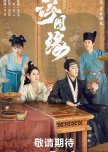
Royal Romp Best Served with Humour
Chen Yuqi and Dylan Wang are delightful pairing as a imperial consort and eunuch respectively in this faux historical romantic comedy. It is a quirky mix of genres that don't always blend well especially in the final phase of the drama, where the show feels like it outstays its welcome. The show is at its best when it doesn’t take itself seriously and remain within its comedic purview.The series starts off with plenty of hilarity as Chen Yuqi’s Bu Yinlou attempts to survive the rough and tumble of palace machinations using her wits. She’s an inveterate gambler and manages to get extricate herself from various problems sometimes with the aid of Dylan Wang’s Xiao Duo, a supposed eunuch in charge of Zhaoding Bureau and other law enforcement agencies. The leads are suspicious of one another’s intentions at first but later become allies and eventually lovers. The banter between them is a hoot especially when they misunderstand each other and there are many laugh out loud moments in those early days.
The pair inevitably find themselves in a love triangle with the recently crowned emperor Murong Gaogong (Peter Ho) whose obsession with Yinlou is… incomprehensible all throughout. He evolves from being a timid prince to a raving paranoid megalomaniac — a caricature rather than a fully fleshed out character. Even when he finally finds out that Yinlou and Xiao Duo are doing the hanky-panky behind his back, he reactions are insanely pathetic. He barely knows Yinlou except for a brief childhood encounter and yet he expends all his energies in obsessively holding on to her to the point of absurdity. As a result of not having his way with her, and suffering one disaster after another he spirals into self-destructive madness. Even though he suffers the fate of all cuckolds, there’s not a lot that’s sympathetic or likeable about him. Instead he is primed as a figure of scorn.
Where the show goes wobbly is when it tries to be serious and soapboxes about the freedom for individuals to choose within the palace walls. Theirs is a forbidden love but Yinlou seems an unlikely mouthpiece that speaks truth to power. The downside to this is that it takes one right out of the experience because let’s face it, nobody cares anything about individual freedom in the days of emperors. Luckily for them, the leads have the intelligence and enough friends to help them with Yinlou’s jail break. But by then, one has had a gutful of a very deranged monarch whose grasp on reality diminishes daily. Where would the opinionated leads be if they had no brains? Dead, would be one possibility. Or contentedly living out the rest of their lives in the palace eating and drinking from the emperor’s table grateful for not being dead.
In some ways I’m surprised that this got made. Or that it even got past the scissor happy censorship with as much as it did. Many of the passionate scenes purportedly got the chop and yet when Yinlou slaps the emperor she gets away with it. Her statements railing against his tyranny are far more radical than all the snogging between the leads. Perhaps it’s the low budget nature of this beast. I can only speculate that those who let this pass think somehow that hardly any one will be watching this and an emperor who is over-the-top crazy can’t possibly have any modern day parallels.
All in all, it’s far more enjoyable when one suspends all manner of disbelief.
Questa recensione ti è stata utile?
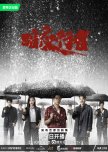
Questa recensione può contenere spoiler
The Broad Road to Perdition
While this drama gives the appearance of being a convoluted ensemble of vested interests and hidden motivations, at its heart is a run-of-the-mill morality tale about the slippery slope descent into evil. The deliberate use of flashbacks and the continuously shifting points of view creates the illusion that this is a far more complex story than it is. In fact, when boiled to its essence, it is rather a straightforward character driven tale of woe. This is made more obvious by the show’s ending where the youngest member of the cast poses the question to her father — “What sort of world would it be if there were no drugs?”. In a bid to answer that question, the show’s protagonist casts his imagination over to an alternate universe where enemies amicably sit across tables sipping tea and playing chess as friends. Heroism is no cynical ploy and trust is genuinely possible. No one would disagree that a world without drugs could be a far less violent one. This is Luo Xiang’s utopian vision of a drug-free where former foes hold hands and sing kumbaya in harmony. Like all utopias, it’s a pipe dream that assumes that a radical change of circumstances would lead to a change of the heart. Indeed, history proves that the opposite is true. Solzhenitsyn’s famous line about the line that separating good and evil passes through the heart reverberates everywhere here.It’s a completely unnecessary (if schmaltzy) appendage to the finale because the drama itself makes a credible case for Solzhenitsyn’s thesis through much of the storytelling. Drugs are almost irrelevant as any kind of rationale for the insidiousness of evil. Barely anyone who trades in it, is also a consumer of it. Instead it is a commodity (as well as a powerful weapon) and almost always a means to an end. It’s mostly about amassing power, sometimes about control and certainly always about greed.
Almost everything about this story begins 5 years earlier — a disastrous attempt by the police to bring down the most powerful drug lords in the business. Mistakes were made and men under the pressure of the moment crossed lines that should never have been crossed — choices once committed to would haunt them forever. Drug trafficking is the mechanism that binds them all together in sordid fashion but it’s the corruptible human soul gripped by fear that destroys even the best of men.
It is through the lenses of three men that the pivotal event and what ensues is constantly being translated or interpreted . First of all there’s the show’s protagonist Luo Xiang (Li Yifei) the idealistic cop who is in it for the long haul. He goes undercover for an extended period of time and remains largely untouched by the vast array of temptations on offer. Despite all the trappings of power and wealth on display, Luo Xiang is unmoved and soldiers on in his quest to rid Hua City of the dregs. The darkness though surrounds him, never overwhelms him. He is steadfastly single-minded about his mission to the point of denying himself a chance to rekindle a romance from the past. He pays a high price for his dedication but he never loses his soul to achieve his ends. He is at the tip of the spear but manages to avoid impaling on it.
The other personality that dominates the story is Liao Yongjia (Stephen Fung) whose intentions are seldom clear. A highly regarded criminal investigator, Liao Yongjia is a man with far too many secrets and hidden agendas to be completely trustworthy. He might see himself as the man with the plan pulling the strings but there are forces outside his control for which he is compelled to respond to at any time. All of that inadvertently reveal him to be a far more ruthless operator than meets the eye. 5 years ago was a catastrophe for a man who prided himself on being a diligent cop.
Yu Shenghai (Gong Haibin), is yet another police officer whose conduct is dubious to say the least. At some level the show paints him as victim as well as a perpetrator. The audience’s perspective on him shifts continuously over the course of the story as the unseen forces of evil persistently know which buttons to push. His road is one paved with many so-called good intentions but it can only lead to one destination. Guilt and shame accompany him as he wrestles with the puppet masters who tug at his strings while he tries desperately to sever all ties that weigh him down.
The intersection of these three paths is what makes the entire show more than just a police procedural and a shoot-up fest. The rogues gallery is a long one indeed and not unexpectedly there are people from both sides of the law that find their picture there. Public persona is just that and no guarantee that the man or woman who dons the uniform will uphold the law if it doesn’t suit. In fact, the uniform might just be the cover needed to trespass the law with impunity and the means to get away with murder most foul.
There's little doubting the calibre of the cast in general. There's no moustache twirling in sight. Even the why-is-there-a-cute-kid-here holds her own when the director is deigned to trot her out. Maybe it's about ramping up the stakes. Maybe it's the odd reprieve from all the plotting and scheming. Maybe it's the reminder that Luo Xiang needs to stay on the straight and narrow if he wants to build that better world he dreams of when he's not dodging bullets and making deals with the unsavoury types.
Questa recensione ti è stata utile?

Intense Romance with Execution Issues
There are certainly elements of a good story here regardless of the obvious anachronisms indicated by the show's title. However, at the end of the day, this was clearly a story in search of a script, director or editor. Or all of the above. The first half was decent and flowed much better. The second half however was weakened by noticeable pacing issues caused by large chunks of exposition via dialogue and unexplained occurrences or allusions to offscreen events. While I don't fault the show for not doing anything particularly clever or groundbreaking, I will come down hard on the lack of consistency in the storytelling. There was never any real doubts that I was watching a romantic comedy and there were laughs to be had all throughout especially from the interactions between the leads. It was also clear that the palace intrigue, such as it was, played second fiddle to the romance. Make no mistake, this is a fairytale and I saw it as such all the way through but it's flaws hold it back from being a much better show than it could have been.However, the editing choices of this drama undeniably caused this viewer whiplash from time to time. It's hard to say whose problem it is because the censorship issues that beset the industry. Nevertheless, it is still incumbent on the director to be far more preemptive about what external obstacles are likely to dish out and be clever about how the material should be put together to escape the censor's knife. I say this because the production values are good. There are some great set pieces and the cinematography is of a high standard. I don't generally comment about costumes because I don't feel qualified but the styling of Liu Ling, the titular character, is a mix bag. After the much anticipated wedding, overnight she's transformed into a dowdy, matronly figure which doesn't flatter her one whit.
It's important to give the cast, especially the leads, their due. The performances range from adequate to good. The interactions and the banter between the leads are some of the better parts of this show. Their chemistry is a delight and the director milks it for whatever it is worth. At least this show understands the meaning of fan servicing. Zheng Yecheng I like a lot. He is nicely broody and mischievous. His enthusiasm for the romance is well-matched by Yuan Bingyan. In all frankness I liked the Shen Yan character more than the Liu Ling one primarily because of the writing. While it's not hard to see why Liu Ling is the insecure, needy, clingy female lead here (particularly when she's been badly treated by family), her over reliance on Shen Yan might come across a bit icky for modern audiences. It's not necessarily a problem in those early days but development on that front ends up being scant. Her early cynicism and world-weariness is interesting although unfortunately it's not sustained. Brother to Shen Yan is Merxat's Shen Yu. The brotherly dynamic is one that I relished and certainly wouldn't have minded more of. Liu Ling's sisterhood with Xu Shijin was also great.
Overall, it is not without charms despite its limitations. There is some plotting and scheming in the background but really this show almost entirely about the sassy princess and her knight in shining armour.
Questa recensione ti è stata utile?

Can I Be Someone Else
2 persone hanno trovato utile questa recensione
Strangers in the Dark
I have a theory about this show. While I never thought that I was watching a garden variety rom com, I laboured under the belief that belying all the absurd coincidences that this was a serious show that had serious things to say about marriage and divorce. Fast forward six weeks later, I question my own judgment wondering what I’d been privy to. I begin by trying to grapple with the question of why for 11.75 episodes nobody ever thinks to go for some kind of relationship counselling. Not a single soul. I wonder if it’s deliberate. Moreover while everyone is decent at diagnosing other people’s problem, they are terrible at perceiving their own hang-ups. Apparently the cult of experts don’t exist in this world where Eun-beom and Ha-ra, two supposed grown-ups stumble around avoiding answers. It may be that hardly anyone reads books anymore but in their world there’s not even an app or a website that people go to for advice. How odd. It’s straight to lawyers and courts we go. Learning takes place accidentally rather than purposefully. And the results speak for themselves.The people behind this, it occurs to me, aren’t interested in any other solutions except divorce. Except that divorce itself is problematic — a convenient exit strategy for two people who haven’t learnt the art of communication or accommodation. And they never have to because there’s divorce to put an end to everything once things turn sour. A get-out-of-jail card as it were. Because they sidestep the fundamentals, the characters default to the same behaviour over and over again expecting a different result.
Realistic? Perhaps. It’s arguable how realistic the show is. But from the point of view of the audience, frustrating.
So I’m inclined to think that the entire project is a storytelling experiment. Whether in earnest or for laughs — I’m still puzzling over that one. The experiment starts with “what if”. What if we were to tell a story about two divorce lawyers who are divorced from one another working cases in the same firm? It would be a hoot, right? A couple of ex-spouses who haven’t been schooled in the art of relationship, who haven’t even learnt to communicate, handling relationships that have “inevitably” reached their endpoint. The result is sheer chaos. All the wisdom of the ages cast aside for this narcissistic introspective trial and error approach to the most foundational of relationships. As if the present generations will be the first to discover something the previous ones haven’t. Underpinning all of this is a materialistic, consumerist impulse as seen in an ex-wife who hops from lover to lover with impunity leaving her ex-husband lawyer to clean up her messes.
Therefore the entire project only makes sense when I think of it as satire. Again I can only speculate because divorced individuals here are mercilessly mocked. Or it’s just modern “love” marriages that’s under fire. So much heartache could be prevented if people actually opened their mouths and uttered coherent words. For a world of actions so dominated by feelings, the people in it are so poor in articulating them. I am left wondering if the moral of the story might be that a world where human agents are driven by emotions unchecked by discernment only leads to chaos. Feelings of goodwill towards another just aren’t enough for marriage. Indeed feelings aren’t substantial enough of a foundation to build any kind of future on.
As a reviewer of dramas there’s a part of me inclined to think of this entire project as a critique of the romantic comedy popularized by Hollywood first and whose mantle has been picked up by K dramas in the past decade. The genre is waning. Cynicism is on the rise. Building paradise on earth is no longer feasible when narcissism has a grip on the culture. No one is willing to change or feel the need to. That’s the troubling part in all the push and pull.
There’s no happily-ever-after her. For the leads that is. Just a tired cycle of withdrawal, miscommunication and conflict. There’s plenty of baggage. The ending seems to be a logical one amidst all the illogical antics that ends in sabotage. Yet one is left feeling dissatisfied because the two people at the centre of the story don’t really get it until it’s too late. Or do they? That’s left open to individual interpretation. But I repeat. Insanity is doing the same thing over and over again expecting a different result.
There’s nothing progressive about that.
Questa recensione ti è stata utile?

Road to Nowhere
Do I really need to see Jing Boran change a light bulb? That’s just one of many niggly questions that comes to mind as I plod my way through Road Home with a gnawing itch to drop it. It’s a lovely angle of him to be sure (as any would be) and perhaps the audience has missed the point that Tan Songyun’s character Gui Xiao is absolutely enamoured with Lu Chen when she fixes her adoring eyes on his strapping figure as he does what most men worth their salt can do at the drop of a hat. When Li Xian changes light bulbs at the boarding house in Meet Yourself, there are multiple reasons for it. It tells us something about the ubiquity of his character. It shows that he’s a handy fellow. It was yet another bit of confirmation that he was the heart and soul of his village — a one man economic engine. But when Lu Chen is swapping out light fittings, it feels like the director and/or script writer don’t really have any idea of how to integrate all of the elements around the romance. Which is the general feeling I get as the “story” progresses. It’s like watching a reality travelogue that I didn’t sign up for. The thing is, the light bulb scene is meaningless here because it doesn’t tell us anything we don’t already know about Lu Chen. The guy is a bomb disposal expert. What’s a light bulb when there’s an explosive device with a complex web of wiring about to go kaboom? Road Home is a show that should be watched at 1.5 x or 2 x speed or not at all. Which leaves me with a conundrum: Jing Boran’s alluring sonorous vocals gets lost in translation.On paper, Road Home should have the potential to be equally effective but the mistake is putting an obvious conflict-free romance at the centre of the story. Except for the godson, none of the other characters have interesting arcs of their own. Worse still they feel disconnected. Their sole purpose is to dance around the leads and support their journey as they inevitably pair up. I’m about 15 episodes in and I still don’t find Gui Xiao a compelling character in her own right. Lu Chen gets to do all the exciting cop stuff while she panics around in the dark wondering if he’s going to live to see another day. It’s by the numbers. There’s no curiosity about any of the characters and how they get to the point that they do. 30 episodes is just too long for a show where there’s so little build up or suspense. By the time the leads tell us that they’re tying the knot, most of the key reveals have come and gone.
It’s a mistake to think that slice-of-life dramas have no plots. (Or meander aimlessly without one) They do. And the really good ones do such a good job of juggling multiple threads that those who watch that the balancing act is actually easy. Part of the problem too with Road Home is that Lu Chen’s SWAT activities are far more interesting than anything else in the show. Consequently I inevitably come to this conclusion about these types of police procedurals — they are veiled recruitment propaganda. Ad campaigns for law enforcement because no one in the their right mind would sign up for SWAT and EOD without overt prodding and/or flag waving. It’s one thing to insert propaganda in a crime show, it’s another in a romance. It’s deadly.
Questa recensione ti è stata utile?

 4
4



















